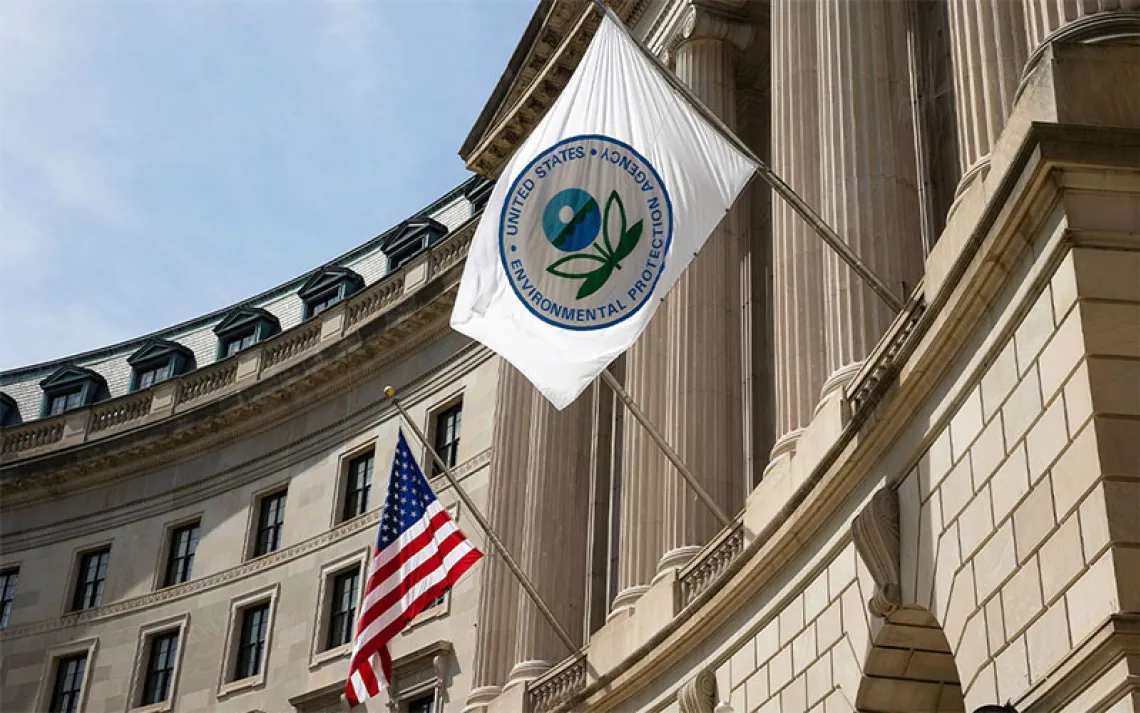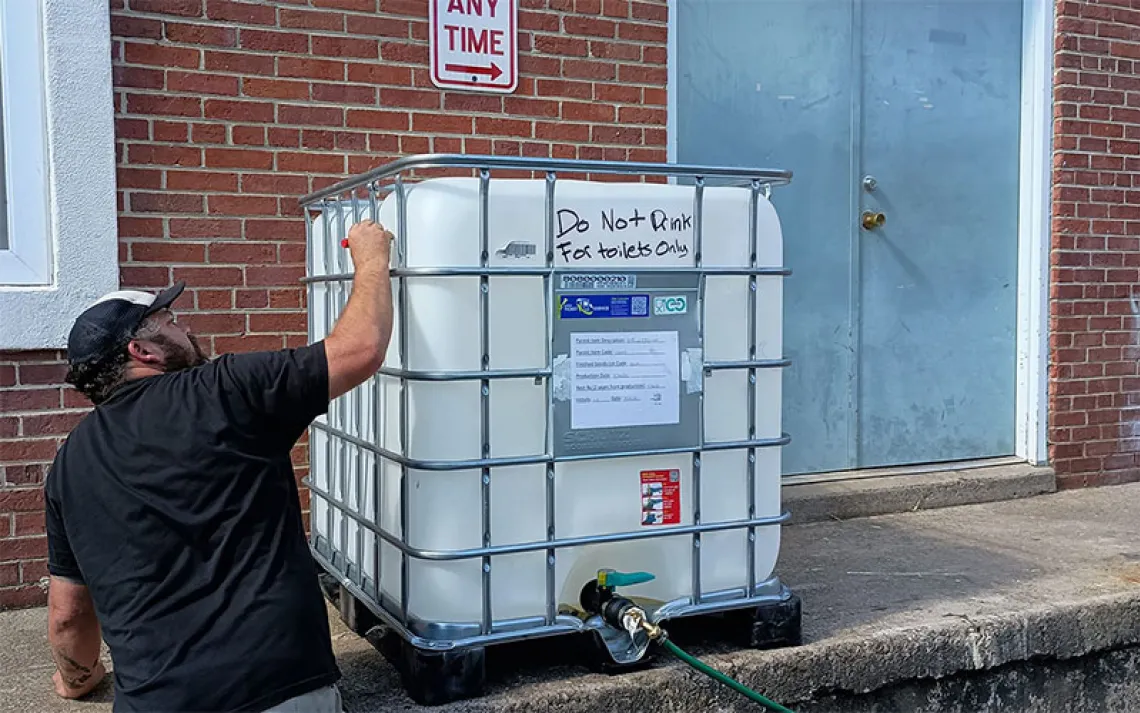Fridays For Future Says “No Thanks” to Prestigious UN Award
Climate activists pass up a prize to make a point

Photo by Jesus Merida/SOPA Images/Sipa USA va AP Images
From September 20 to 27, an unprecedented number of youth activists flooded the streets of cities around the world as climate strikes were held to coincide with the UN Climate Action Summit in New York. While the record-breaking youth mobilizations were covered in the mainstream media, one significant act of protest slipped by almost unnoticed.
On Thursday, September 26, Fridays For Future activists were invited to receive a Champions of the Earth prize during the annual award ceremony of the United Nations Environment Programme (UNEP). Previous recipients include the prince of Jordan, French president Emmanuel Macron, former vice president Al Gore and the Honduran environmental activist Berta Cáceres, who was assassinated in 2016. But when the six teenage organizers representing Fridays For Future took to the stage, they turned down the award, becoming the first in history to refuse the UN's highest environmental honor.
When 15-year-old Kallan Benson first stood on stage alongside other Fridays For Future activists from around the world, she says she felt uncomfortable. “I mean . . . we are grassroots activists and this is not a normal event for us. So all of us were feeling like we’re just kind of underdressed and not quite fitting into the room.” The group posed for obligatory photos as they were handed the luminous trophy, clutching the corners of a banner with “Fridays For Future” printed in rainbow letters.
Then Benson approached the podium, where she informed the audience that in spite of the honor, Fridays For Future would not accept the Champions of the Earth award. “Awards are for celebrating achievement, but the achievement we seek has not occurred,” she said. “The world is in climate crisis, and actions of the United Nations are failing to stop it.”
That Benson and other young people were calling out UNEP—the institution presenting them with the prize—was not a total surprise to those planning the event. After all, Benson and others had submitted the speech ahead of the ceremony per standard protocol, so UN staff could upload it to the teleprompter. Still, the audience reacted with gasps.
“There is no denying the science,” Benson continued. “There is no denying the evidence. We are experiencing catastrophic storms, floods, fires, and droughts.” She looked to the audience, and her otherwise steady voice rose to a shout: “People. Are. Dying.”
Then Benson went on to say that young people would symbolically “hold” the award until adults, including UN representatives who “hold the power to save humanity from itself,” act with the urgency fit to address the climate crisis. In that imagined future, she said, UNEP would “earn back” the honor.
By rejecting the award, youth activists join the ranks of many before them who’ve passed on a prize for a purpose. In 1963, an African American man named Lincoln Lynch surprised those who welcomed him to accept an NAACP award at the centennial celebration of the Emancipation Proclamation by calling out fellow African Americans who had reached middle-class status. His reminder that racial justice would not be actualized until every black person “attained freedom” helped redirect picketing on Long Island toward the kind of direct action that defined the civil rights movement.
Ten years later, in 1973, Marlon Brando declined an Oscar for his performance in The Godfather. In his place, Sacheen Littlefeather, an Apache woman dressed in traditional attire, announced that Brando was turning down the award on account of the mistreatment and misrepresentation of Native Americans in the film industry, and to call attention to the recent happenings at Wounded Knee. That same year, Vietnamese politician Lê Đuc Tho became the first to reject a Nobel Peace Prize, which he had been awarded with Henry Kissinger for peace talks on ending the violence in Southeast Asia. The award was premature, he said, because the Vietnam War was not over. Embarrassed, Kissinger unsuccessfully attempted to return the award too. He would later be put on trial for war crimes in Vietnam, among other places.
Benson says she and her peers were aware of others who’ve boycotted awards to bring attention to an issue, but that the decision not to accept this one developed organically. The email message announcing that Fridays For Future had earned the UNEP prize came just as the activists were stuffing their suitcases with climate strike signs and passports to head to New York.
The youth-led organization has grown exponentially over the past year—there are now over 2,000 strike locations, where there were just nine in January 2019, but its structure is nonhierarchical, so it wasn’t immediately clear who should show up to accept the award. Thunberg would be heading to Montreal the day of the ceremony and wouldn’t be able to attend. So a handful of activists started a Google Doc on which some 15 young people across different time zones drafted remarks. “The more we continued to refine the speech, the more we realized how we couldn’t take [the award],” Benson says. Eleven-year-old Zane Kalmus-Kunde, one of the young people who helped draft the speech, and who has held climate strikes in the Los Angeles area since December 2018, watched Benson deliver the address from California. “It made me feel good to hear what should have been said a long time ago,” he said.
In fact, the message the international Fridays For Future delegation delivered is really just the latest iteration of what young people have been trying to tell the UN for almost 30 years. In 1992, Severn Suzuki spoke on behalf of a group of 12- and 13-year-olds who had raised money to fly to the UN Earth Summit in Rio de Janeiro. “Coming up here today, I have no hidden agenda,” she told the room, which had only a sprinkling of delegates in attendance. “I am fighting for my future.” She linked the mass extinction of flora and fauna with pollution, cancer, and poverty and reminded adults in the room of the urgency of the crisis. “All this is happening before our eyes, and yet we act as if we have all the time we want and all the solutions.”
At the UN’s annual climate meeting in 2011, COP18 in Qatar, 22-year-old Anajali Appadurai reminded another marginally filled room that delegates had been negotiating her entire life. “In that time, you’ve failed to meet pledges, you’ve missed targets, and you’ve broken promises,” she said. “Where is the courage in these rooms? . . . There is real ambition . . . but it’s been dismissed as radical, deemed not politically possible.” And of course, in 2018, Greta Thunberg’s COP24 address echoed the same ideas, with lines that have gone viral, like, “you say you love your children above all else, and yet you are stealing their future in front of their very eyes.”
One notable problem with appealing to the UN for action on climate is that UNEP lacks teeth. Scholars like UMass Boston professor Maria Ivanova and George Washington University law professor Steve Charnovitz have pointed out that the organization does not have the power to enforce global initiatives like the Paris Agreement, nor to fund responses to crucial assessments like the 2018 IPCC report.
Representatives for UNEP recognize these challenges. Communications director Naysán Sahban noted in an email that last month’s Youth Climate Summit and Climate Action Summit were “still far from sufficient.” Fridays For Future’s decision to “hold” the award for UNEP to earn back should be treated as an opportunity. “This, in essence, is a challenge to governments, to business, to all of us to take responsibility and deliver on the commitments the international community made in 1972 when creating UNEP,” Ivanova said.
At the close of Benson’s speech, the teenagers representing Fridays For Future exited the stage to a standing ovation. “That, ladies and gentlemen, is to tell it how it is,” UNEP director Inger Andersen told the crowd. Benson says the group did feel heard at the ceremony. “Outside of the room, I don’t think we got much attention,” she says. “But I do think it is a step forward and an opportunity for youth to keep using their voices.”
This article has been updated since publication.
Watch Kallan Benson's full speech at the UNEP's annual awards ceremony:
 The Magazine of The Sierra Club
The Magazine of The Sierra Club



